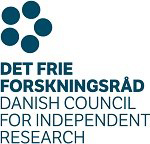Helping Hands: Research network on the everyday border work of European citizens
Closed project. Project period: 2017-19.
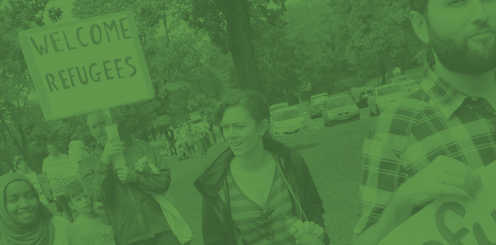
The interdisciplinary research network gathers researchers (ethnologists, anthropologists, human geographers, borders and migration scholars), from 6 different countries; Denmark, Sweden, Norway, Germany, the Netherlands and Scotland. Through a selection of six European locales, the network will explore the different ways of doing solidarity work in European everyday life, in support of refugees coming to Europe.
As a consequence of people fleeing their home countries, especially Syria, and an increasing territorialisation of Islamic State, Europe is currently experiencing an almost unprecedented refugee crisis. The response of the European Union has primarily been to enforce its external borders using naval blockades and FRONTEX-led programmes to push back migrants even before they enter the European continent. The establishing of a controversial refugee quota system among EU member states is now being implemented but a common EU migration policy has so far not been realized. Instead individual states are enhancing controls at their inner EU borders, a tendency which would have been inconceivable until recently. Meanwhile, the number of deceased refugees is increasing as reported by the International Organization for Migration (IOMC).
Among European citizens responses to the refugee crisis have differed. Concurrent to moral panics as well as outbursts of violence and discrimination, a plethora of counter movements can be observed, either organised in cooperation with refugee organisations and NGO’s, or in the shape of privately organized initiatives.
This research network wishes to pursue the different ways in which people of everyday life Europe choose to ‘give a helping hand’, doing their own aiding work in support of refugees coming to Europe. From self-organized fundraising to illegal smuggling of single individuals across borders, a myriad of private initiatives are emerging. Whether it concerns the collection of used tents from Roskilde Festival in Denmark or the creation of Facebook groups supporting refugees in e.g. juridical counselling and translation services, the activities tend to signal that formal decision-making and political action is not enough.
By ethnographically investigating the rationales, aspirations and experiences of the private initiatives, the network aims at enhancing our understanding of how everyday ‘aiding practices’ can be seen as ways of enacting the European citizen. The initiatives seem to be taken behind the back of and in response to a somewhat paralyzed EUrope. Statements from media interviews indicate that some of the citizens’ actions are accompanied by arguments for global solidarity, tolerance and human rights; others relate more to national perceptions expressing the wish to offer alternative and more ‘truly European’ versions of the nation state’s responses to the arriving refugees. Hence, there are signs of an everyday cosmopolitanism, which might even be understood as a genuinely new mode of global awareness Europeanisation enacting new versions of and ideals for the national. One hypothesis of the project is thus that the aiding practices are not merely a critique or a distancing from the European project, but rather signalling new kinds of European citizen awareness and ‘everyday life Europeanisation’.
References
Rumford, C. (2008): Citizens and Borderwork in Contemporary Europe. London: Routledge.
Isin, E. F (2009): ‘Citizenship in flux: The figure of the activist citizen’. Subjectivity 29, pp. 367-388 (December 2009)
The main activities of the research network comprise one kick-off seminar, three ‘field workshops’, and one larger closing conference including a master class.
Kick-off seminar
31 May – 2 June 2017 at the University of Copenhagen
Download the Kick-off seminar programme (pdf)
The seminar is open to all, includes two keynote lectures and a round-table with experts in the field.
Field workshops
Three field workshops with network members including fieldwork excursions to a selection of the relevant fields in question. The field workshops are to be held in Hamburg, Nijmegen, Glasgow, Copenhagen.
Concluding two-day conference
The network will organize concluding two-day conference with open call and a master class 2019.
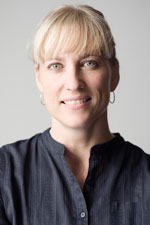
Marie Sandberg, PhD, Associate Professor (PI), European Ethnology, SAXO Institute, and Centre for Advanced Migration Studies (AMIS), University of Copenhagen.
Email: sandberg@hum.ku.dk
Marie Sandberg is trained in the field of European Ethnology. Working in the fields of European cultural processes Marie Sandberg’s overall research interest is the ‘Europeanisation of everyday life’. Her research themes are everyday border practices and migration. For instance, she has conducted fieldwork at the German-Polish border, as well as among Polish circular migrants in Denmark. As a steering group member of the Centre for Advanced Migration Studies (AMIS), University of Copenhagen, and former Vice-Chair of the Nordic Migration Network, she is vividly engaged in discussions within the international as well as Nordic fields of migration and border studies. Since 2013 she is the editor in chief (co-editor is prof. Monique Scheer, Eberhard Karls Universität Tübingen) of Ethnologia Europaea – Journal of European Ethnology.
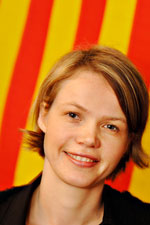
Dorte Jagetic Andersen, PhD, Associate Professor (Co-PI) Centre for Border Region Studies, Department of Political Science, University of Southern Denmark.
Email: doa@sam.sdu.dk
Dorte Jagetic Andersen has a background in European Ethnology, European Continental Philosophy and Political Science. Her main research interest concerns identity-formation in areas influenced by the presence of geopolitically drawn borders, focusing particularly on conflict and their resolution(s). Recently she has been preoccupied with ethnographic studies in the border regions of the now Croatian parts of the former Yugoslavia, including Istria, Neum-Neretva and the Vukovar area in Slavonia, studying how local responses to the violent conflicts of the 1990s have all appropriated images of regional belonging reconciling the tense relations between past, present and future and thus working as counterweight to developments of nationalism, which are widespread in these areas. She is part of the administrative body of the Association of Border Studies.
Network members
The multidisciplinary network draws together a broad range of academic and professional expertise in the fields of European Ethnology, Migration Studies, European Studies and Border Studies.
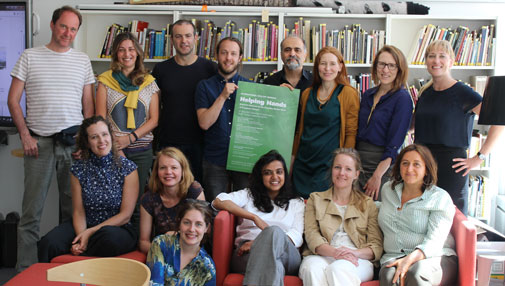
Kolar Aparna, PhD candidate, Nijmegen Centre for Border Research (NCBR), Radboud University.
Synnøve Bendixsen, PhD, postdoc Social Anthropology, University of Bergen.
Daniela DeBono, PhD, Senior Lecturer, Malmö Institute for Studies of Migration (MiM), Malmö University.
Gertraud Koch, Professor, Volkskunde/Kulturanthropologie, University of Hamburg
Olivier T. Kramsch, PhD, Senior Lecturer, Nijmegen Centre for Border Research (NCBR), Radboud University.
Marlene Paulin Kristensen, PhD candidate, SAXO Institute, Ethnology and Centre for Advanced Migration Studies (AMIS), University of Copenhagen.
Cetta Mainwaring, PhD, Leverthume Early Career Fellow, Social and Political Sciences and Glasgow Refugee, Asylum and Migration Network (GRAMNet), University of Glasgow
Gareth Mulvey, PhD, Lord Kelvin Adam Smith Research Fellow, Social and Political Sciences and Glasgow Refugee, Asylum and Migration Network (GRAMNet), University of Glasgow
Kerstin Poehls, Juniorprofessorin Volkskunde/Kulturanthropologie, University of Hamburg.
Teresa Piacentini, PhD, Lecturer, Social and Political Sciences and Glasgow Refugee, Asylum and Migration Network (GRAMNet), University of Glasgow
Joris Schapendonk, PhD, Assistant Professor, Nijmegen Centre for Border Research (NCBR), Radboud University
Affiliated co-participants
Huib Ernste, professor, Nijmegen Centre for Border Research (NCBR), Radboud University
Funding
This project is financed by the Danish Council for Independent Research (DFF/6107-00111).
Project period: 2017-2019
Europe Trouble
Contact
PI:
Marie Sandberg
Associate Professor
European Ethnology
SAXO Institute and Centre for Advanced Migration Studies (AMIS)
University of Copenhagen

